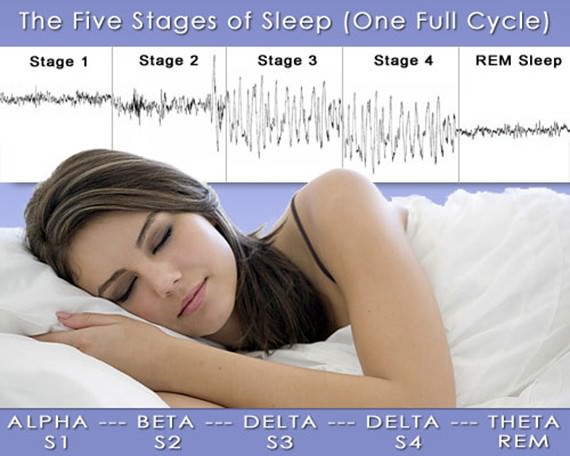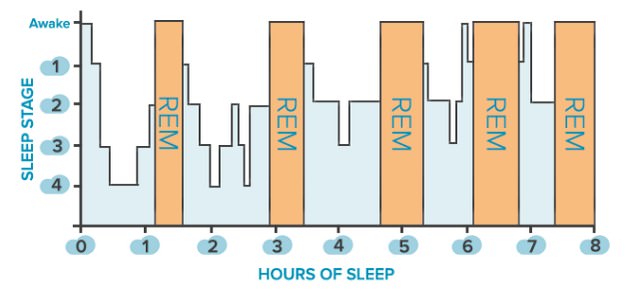The Stages of Sleep
Each and every night, your brain transitions through different stages of sleep.
Each stage has different effects on your body - from physical restoration during deep sleep, to memory consolidation during dreams.
All together, these stages add up to about 90-110 minutes, making up one complete sleep cycle.

The Four Stages of Sleep
We used to identify five stages of sleep (as above) but recently Stages 3 and 4 have been grouped together for their similarities.
Let's take a closer look at those four stages:
- NREM Stage 1 is a light sleep from which you are easily woken. You begin to lose muscle tone, causing twitches and hypnic jerks. You have hypnagogic hallucinations, swirling light and color patterns which hypnotize your mind into a restful sleep. Stage 1 also marks the loss of self-awareness and most sensory attachment to the physical world. Your brainwave frequencies descend from Alpha through Theta (4-7 Hz).
- NREM Stage 2 is marked by a loss of nearly all muscle tone so your physical body can't act out your forthcoming dreams. Although your brainwaves have slowed further, they do show brief bursts of higher brainwave activity called sleep spindles and K-complexes. You spend around half of all your sleep in Stage 2; a light dreamless sleep.
- NREM Stage 3 and 4 is known as slow-wave sleep (SWS), consisting of unconscious delta activity. The sleeper is less responsive to the environment and most stimuli cause no reaction. If you are woken you will feel especially dopey and confused for a couple of minutes. Another dreamless stage of sleep, it is actually the most likely time for sleepwalking to occur.
- REM Sleep marks the onset of dreaming. It's known as paradoxical sleep because the sleeper, though showing more active brainwaves than before, is harder to awaken. If you are woken from REM sleep you're more likely to jump right back in during a later nap. REM sleep deprivation impairs our ability to learn complex tasks and form long term memories.
When is The Best Time for Lucid Dreaming?
Your longest and most memorable lucid dreams usually occur in the fourth and fifth sleep cycles of the night - after about six hours of sleep - during the REM sleep stages. Critically, during these later sleep cycles, periods of REM sleep become longer.

The graph shows REM sleep occurring at the end of each sleep cycle. This is your most memorable dream time.
If you don't wake up to an alarm, you'll find you often wake directly from a dream, which makes it much easier to remember. When this happens - don't move. Just allow yourself to gently re-enter the dream, while thinking "I'm dreaming".
This graph also shows how it's essential for lucid dreamers to get sufficient shuteye and not miss out on REM sleep by cutting sleep short. Indeed, the more chances you have to sleep in, the better. Sleeping-in allows extended REM time in the morning, more vivid dreams, and more chances to become lucid.
How Much Sleep Does The Average Person Need?
So, how much sleep do you meed?
It seems that the amount of sleep required differs from person to person, however as a rough guide experts have come up with the following daily sleep guide based on age:
- Newborns (0-3months): 14-17 hours
- Babies (4-11 months): 12-15 hours
- Toddlers (1-2 years): 11-14 hours
- Preschoolers (3-5 years): 10-13 hours
- Children (6-13 years): 9-11 hours
- Teenagers (14-17 years): 8-10 hours
- Adults (18-64): 7-9 hours
- Elderly (65+ years): 7-8 hours
What's also important is to look at how you're waking up - ie, after how many sleep cycles.
If you wake to an alarm every day, your sleep is likely to be interrupted mid-cycle. This is such a common problem it's known as getting out of the wrong side of the bed. This may also explain why you're not a morning person.
An alarm cuts your sleep short arbitrarily and denies your final REM phase. It's much healthier to wake up after the cycle is complete which is what happens without an alarm.
Fortunately, there is a growing array of sleep tech to achieve this without being two hours late for work every day. These gadgets and apps can track your sleep cycles and wake you only once a cycle is complete.
How Long Do Dreams Last?
We can measure the length of dream time using an EEG machine which reads brainwave activity. Dreams are directly correlated to REM sleep - to the extent that your eyes can move and track in the same direction you are looking in the dream.
The brainwave readings tell us that REM sleep at the end of the first sleep cycle lasts only a few minutes. Much of the first cycle is dedicated to non-REM sleep, driven by the need for physical rest. So, these early dreams are often fleeting. You are unlikely to remember them and they're unlikely to yield lucid dreams.
As you sleep on through the night, your REM phases grow longer in each sleep cycle. By morning, your fourth or fifth sleep cycle (ending when you wake up for the day) may allow for 45-60 minutes of uninterrupted REM sleep. It's perfect for lucid dreaming.
"My dream lasted a lifetime!"
Every now and then I hear an urban myth about lucid dreaming that someone had a dream that encompassed an entire lifetime.
I've had such a dream, while taking the dream intensifier, Calea Z. Time seemed to stretch and I felt like I was in this dream for years. But as vivid as the dream was, I didn't literally experience those years, minute-for-minute. It was more like watching an epic movie that spans 200 years in the space of two hours, yet you feel like you were there longer.
Generally, the timeframe of regular dreams are in line with reality. However it's always difficult to judge the length of a dream from the first-hand perspective of dreaming it. Whether you're lucid or not, time can be distorted in dreams - and there are a lack of constants against which you can measure the passing of dream events.
So, if you feel a dream lasted for days or years, it's just your perception of events in the dream that made it seem to last so long. I don't believe that such dreams - however mind-blowing in their realism and adventure - are comparable to the experience of real time passing in the waking world.
How Long Do Lucid Dreams Last?
Like regular dreams, lucid dreams can last anywhere from a few seconds up to an hour (and possibly even more). For me, a typical lucid dream lasts 10-20 minutes.
Most beginners find their lucid dream collapses within a few seconds because the emotions of becoming lucid are so overwhelming. However with a few simple dream stabilization methods, you can massively prolong your lucid dreams.
As soon as I learned how to prolong my lucid dreams, it opened up a world of possibilities.
My dream world posed a new adventure playground, in which I could travel anywhere and do anything I wanted to with complete clarity and awareness.
What's more, these stabilization techniques serve to enhance the dream clarity and my ability to control it, while preventing me from waking up prematurely.
To learn how to control your dreams in this way, just check out 10 Steps To Lucid Dreams- our free guided study program for beginners.

















